Analysis of the New Zealand Curriculum Framework and Leadership
VerifiedAdded on 2022/08/19
|5
|1016
|15
Report
AI Summary
This report provides an analysis of the New Zealand Curriculum Framework, examining three articles that offer different perspectives on improving curriculum understanding and leadership practices within the education system. The analysis synthesizes key concepts from these articles, including the importance of identifying curriculum conceptions, the role of effective leadership in addressing institutional challenges, and the streamlining of curriculum standards. The report highlights the applicability of effective leadership strategies, particularly those emphasizing leadership skills among administrators, to healthcare practice. The report concludes by emphasizing the importance of effective leadership in providing crisis management and effective healthcare services.
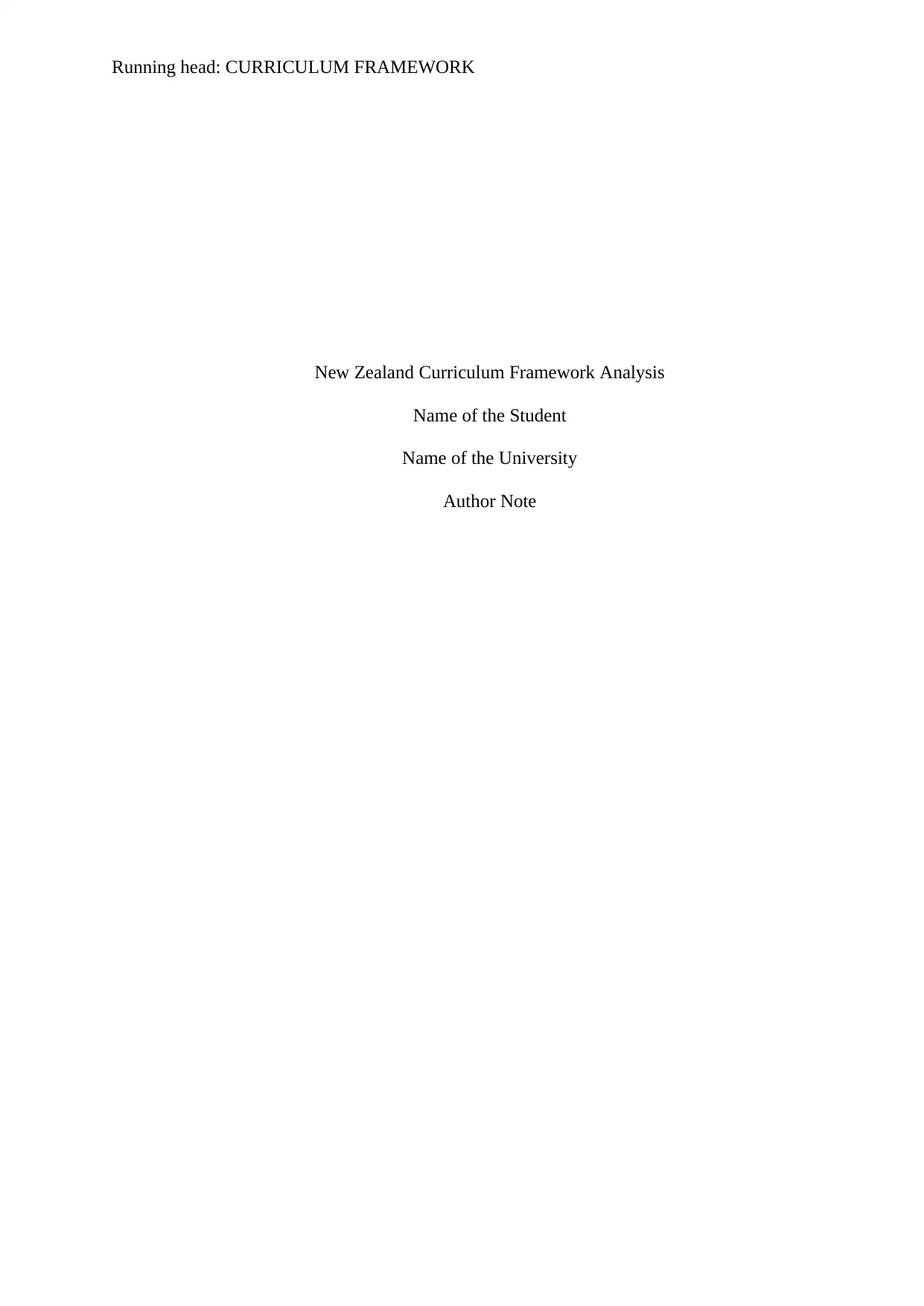
Running head: CURRICULUM FRAMEWORK
New Zealand Curriculum Framework Analysis
Name of the Student
Name of the University
Author Note
New Zealand Curriculum Framework Analysis
Name of the Student
Name of the University
Author Note
Paraphrase This Document
Need a fresh take? Get an instant paraphrase of this document with our AI Paraphraser
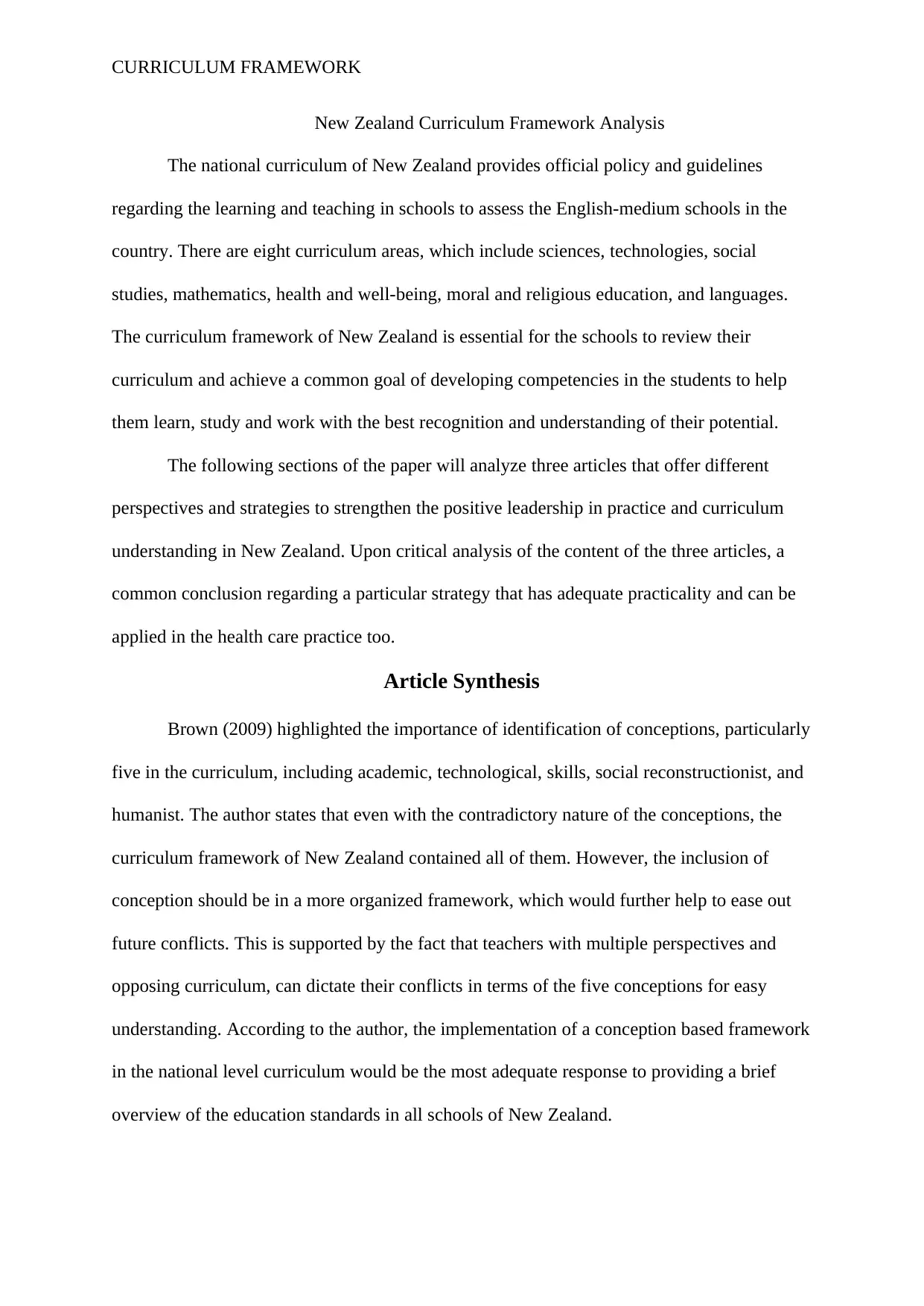
CURRICULUM FRAMEWORK
New Zealand Curriculum Framework Analysis
The national curriculum of New Zealand provides official policy and guidelines
regarding the learning and teaching in schools to assess the English-medium schools in the
country. There are eight curriculum areas, which include sciences, technologies, social
studies, mathematics, health and well-being, moral and religious education, and languages.
The curriculum framework of New Zealand is essential for the schools to review their
curriculum and achieve a common goal of developing competencies in the students to help
them learn, study and work with the best recognition and understanding of their potential.
The following sections of the paper will analyze three articles that offer different
perspectives and strategies to strengthen the positive leadership in practice and curriculum
understanding in New Zealand. Upon critical analysis of the content of the three articles, a
common conclusion regarding a particular strategy that has adequate practicality and can be
applied in the health care practice too.
Article Synthesis
Brown (2009) highlighted the importance of identification of conceptions, particularly
five in the curriculum, including academic, technological, skills, social reconstructionist, and
humanist. The author states that even with the contradictory nature of the conceptions, the
curriculum framework of New Zealand contained all of them. However, the inclusion of
conception should be in a more organized framework, which would further help to ease out
future conflicts. This is supported by the fact that teachers with multiple perspectives and
opposing curriculum, can dictate their conflicts in terms of the five conceptions for easy
understanding. According to the author, the implementation of a conception based framework
in the national level curriculum would be the most adequate response to providing a brief
overview of the education standards in all schools of New Zealand.
New Zealand Curriculum Framework Analysis
The national curriculum of New Zealand provides official policy and guidelines
regarding the learning and teaching in schools to assess the English-medium schools in the
country. There are eight curriculum areas, which include sciences, technologies, social
studies, mathematics, health and well-being, moral and religious education, and languages.
The curriculum framework of New Zealand is essential for the schools to review their
curriculum and achieve a common goal of developing competencies in the students to help
them learn, study and work with the best recognition and understanding of their potential.
The following sections of the paper will analyze three articles that offer different
perspectives and strategies to strengthen the positive leadership in practice and curriculum
understanding in New Zealand. Upon critical analysis of the content of the three articles, a
common conclusion regarding a particular strategy that has adequate practicality and can be
applied in the health care practice too.
Article Synthesis
Brown (2009) highlighted the importance of identification of conceptions, particularly
five in the curriculum, including academic, technological, skills, social reconstructionist, and
humanist. The author states that even with the contradictory nature of the conceptions, the
curriculum framework of New Zealand contained all of them. However, the inclusion of
conception should be in a more organized framework, which would further help to ease out
future conflicts. This is supported by the fact that teachers with multiple perspectives and
opposing curriculum, can dictate their conflicts in terms of the five conceptions for easy
understanding. According to the author, the implementation of a conception based framework
in the national level curriculum would be the most adequate response to providing a brief
overview of the education standards in all schools of New Zealand.
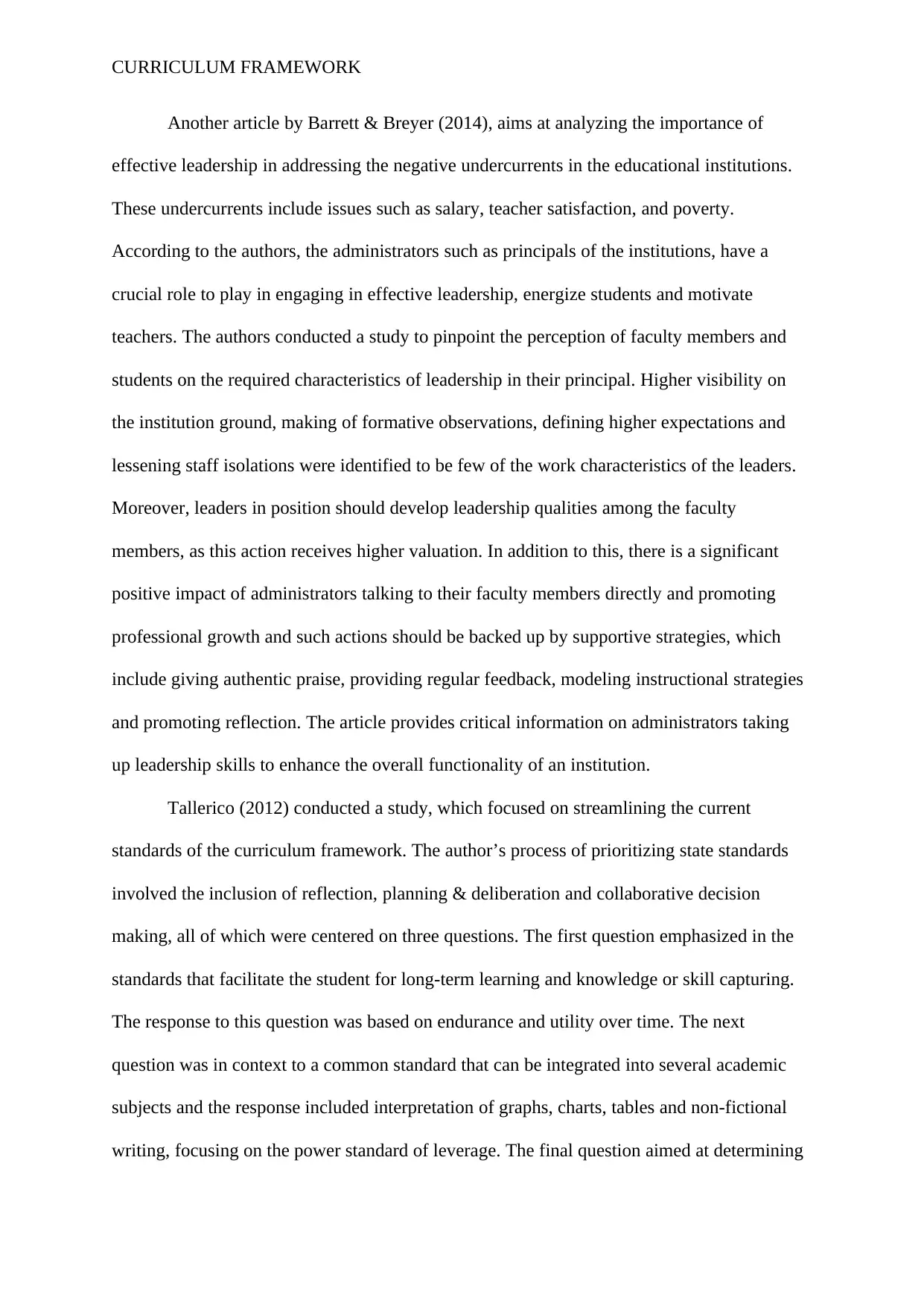
CURRICULUM FRAMEWORK
Another article by Barrett & Breyer (2014), aims at analyzing the importance of
effective leadership in addressing the negative undercurrents in the educational institutions.
These undercurrents include issues such as salary, teacher satisfaction, and poverty.
According to the authors, the administrators such as principals of the institutions, have a
crucial role to play in engaging in effective leadership, energize students and motivate
teachers. The authors conducted a study to pinpoint the perception of faculty members and
students on the required characteristics of leadership in their principal. Higher visibility on
the institution ground, making of formative observations, defining higher expectations and
lessening staff isolations were identified to be few of the work characteristics of the leaders.
Moreover, leaders in position should develop leadership qualities among the faculty
members, as this action receives higher valuation. In addition to this, there is a significant
positive impact of administrators talking to their faculty members directly and promoting
professional growth and such actions should be backed up by supportive strategies, which
include giving authentic praise, providing regular feedback, modeling instructional strategies
and promoting reflection. The article provides critical information on administrators taking
up leadership skills to enhance the overall functionality of an institution.
Tallerico (2012) conducted a study, which focused on streamlining the current
standards of the curriculum framework. The author’s process of prioritizing state standards
involved the inclusion of reflection, planning & deliberation and collaborative decision
making, all of which were centered on three questions. The first question emphasized in the
standards that facilitate the student for long-term learning and knowledge or skill capturing.
The response to this question was based on endurance and utility over time. The next
question was in context to a common standard that can be integrated into several academic
subjects and the response included interpretation of graphs, charts, tables and non-fictional
writing, focusing on the power standard of leverage. The final question aimed at determining
Another article by Barrett & Breyer (2014), aims at analyzing the importance of
effective leadership in addressing the negative undercurrents in the educational institutions.
These undercurrents include issues such as salary, teacher satisfaction, and poverty.
According to the authors, the administrators such as principals of the institutions, have a
crucial role to play in engaging in effective leadership, energize students and motivate
teachers. The authors conducted a study to pinpoint the perception of faculty members and
students on the required characteristics of leadership in their principal. Higher visibility on
the institution ground, making of formative observations, defining higher expectations and
lessening staff isolations were identified to be few of the work characteristics of the leaders.
Moreover, leaders in position should develop leadership qualities among the faculty
members, as this action receives higher valuation. In addition to this, there is a significant
positive impact of administrators talking to their faculty members directly and promoting
professional growth and such actions should be backed up by supportive strategies, which
include giving authentic praise, providing regular feedback, modeling instructional strategies
and promoting reflection. The article provides critical information on administrators taking
up leadership skills to enhance the overall functionality of an institution.
Tallerico (2012) conducted a study, which focused on streamlining the current
standards of the curriculum framework. The author’s process of prioritizing state standards
involved the inclusion of reflection, planning & deliberation and collaborative decision
making, all of which were centered on three questions. The first question emphasized in the
standards that facilitate the student for long-term learning and knowledge or skill capturing.
The response to this question was based on endurance and utility over time. The next
question was in context to a common standard that can be integrated into several academic
subjects and the response included interpretation of graphs, charts, tables and non-fictional
writing, focusing on the power standard of leverage. The final question aimed at determining
⊘ This is a preview!⊘
Do you want full access?
Subscribe today to unlock all pages.

Trusted by 1+ million students worldwide
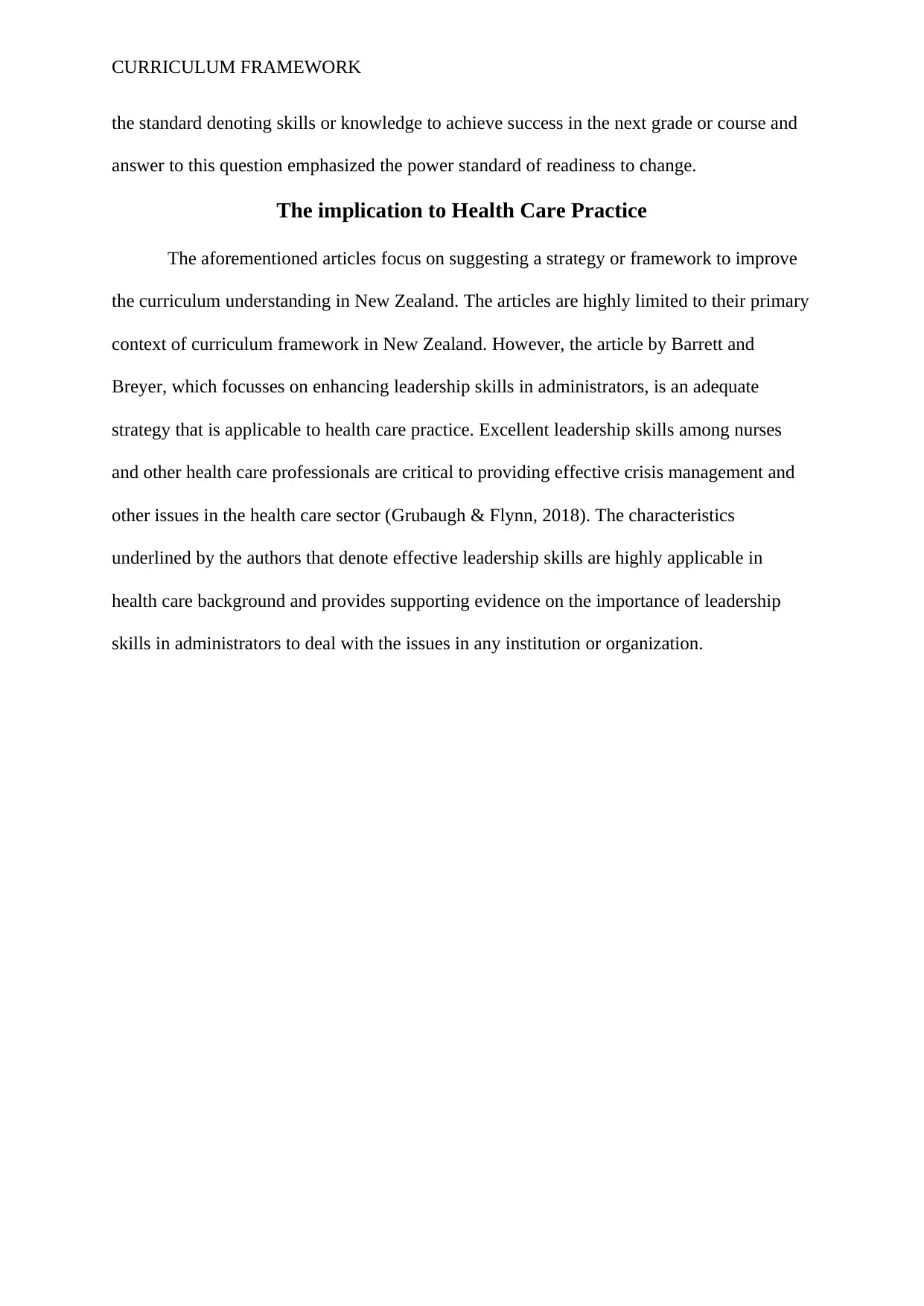
CURRICULUM FRAMEWORK
the standard denoting skills or knowledge to achieve success in the next grade or course and
answer to this question emphasized the power standard of readiness to change.
The implication to Health Care Practice
The aforementioned articles focus on suggesting a strategy or framework to improve
the curriculum understanding in New Zealand. The articles are highly limited to their primary
context of curriculum framework in New Zealand. However, the article by Barrett and
Breyer, which focusses on enhancing leadership skills in administrators, is an adequate
strategy that is applicable to health care practice. Excellent leadership skills among nurses
and other health care professionals are critical to providing effective crisis management and
other issues in the health care sector (Grubaugh & Flynn, 2018). The characteristics
underlined by the authors that denote effective leadership skills are highly applicable in
health care background and provides supporting evidence on the importance of leadership
skills in administrators to deal with the issues in any institution or organization.
the standard denoting skills or knowledge to achieve success in the next grade or course and
answer to this question emphasized the power standard of readiness to change.
The implication to Health Care Practice
The aforementioned articles focus on suggesting a strategy or framework to improve
the curriculum understanding in New Zealand. The articles are highly limited to their primary
context of curriculum framework in New Zealand. However, the article by Barrett and
Breyer, which focusses on enhancing leadership skills in administrators, is an adequate
strategy that is applicable to health care practice. Excellent leadership skills among nurses
and other health care professionals are critical to providing effective crisis management and
other issues in the health care sector (Grubaugh & Flynn, 2018). The characteristics
underlined by the authors that denote effective leadership skills are highly applicable in
health care background and provides supporting evidence on the importance of leadership
skills in administrators to deal with the issues in any institution or organization.
Paraphrase This Document
Need a fresh take? Get an instant paraphrase of this document with our AI Paraphraser
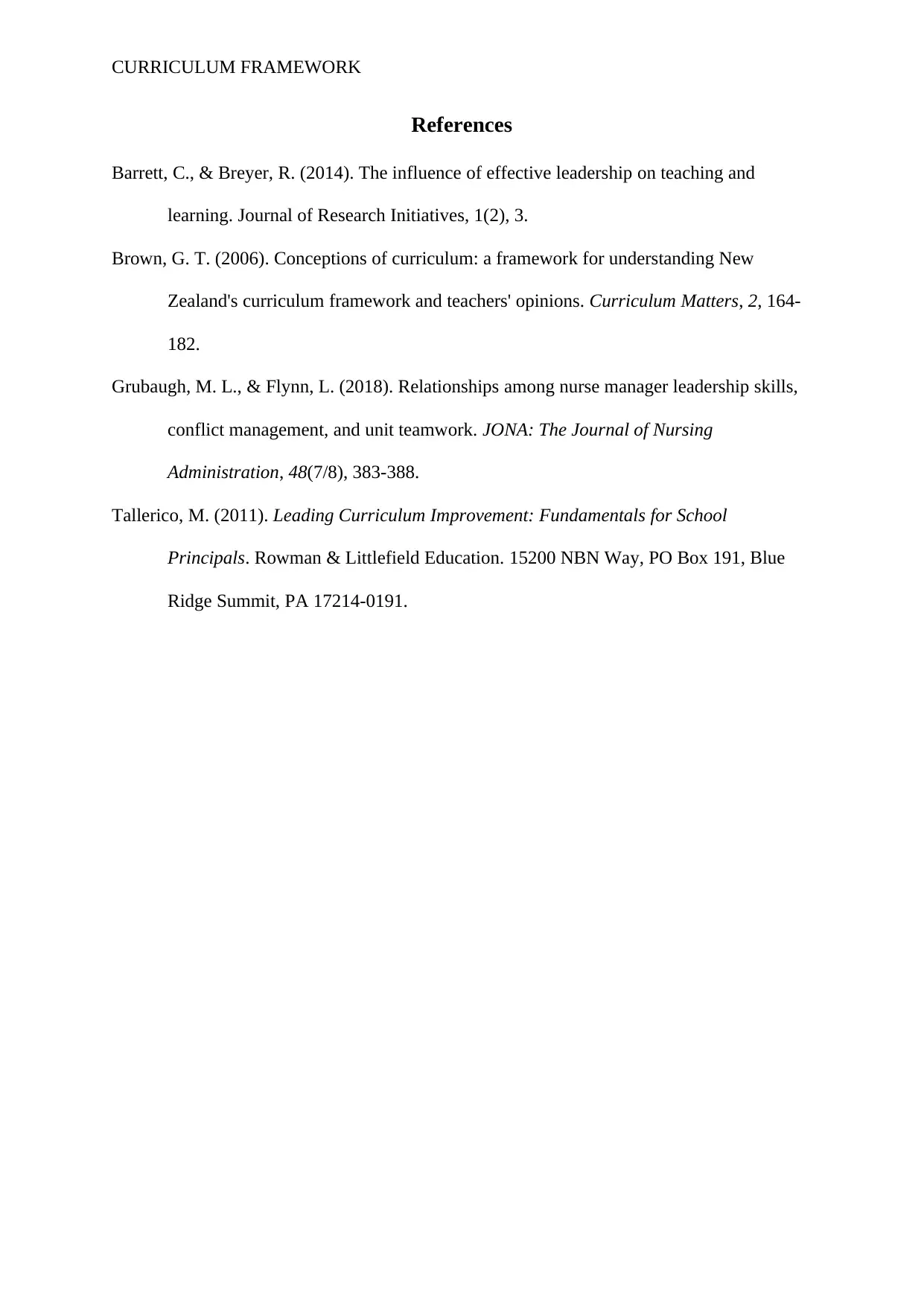
CURRICULUM FRAMEWORK
References
Barrett, C., & Breyer, R. (2014). The influence of effective leadership on teaching and
learning. Journal of Research Initiatives, 1(2), 3.
Brown, G. T. (2006). Conceptions of curriculum: a framework for understanding New
Zealand's curriculum framework and teachers' opinions. Curriculum Matters, 2, 164-
182.
Grubaugh, M. L., & Flynn, L. (2018). Relationships among nurse manager leadership skills,
conflict management, and unit teamwork. JONA: The Journal of Nursing
Administration, 48(7/8), 383-388.
Tallerico, M. (2011). Leading Curriculum Improvement: Fundamentals for School
Principals. Rowman & Littlefield Education. 15200 NBN Way, PO Box 191, Blue
Ridge Summit, PA 17214-0191.
References
Barrett, C., & Breyer, R. (2014). The influence of effective leadership on teaching and
learning. Journal of Research Initiatives, 1(2), 3.
Brown, G. T. (2006). Conceptions of curriculum: a framework for understanding New
Zealand's curriculum framework and teachers' opinions. Curriculum Matters, 2, 164-
182.
Grubaugh, M. L., & Flynn, L. (2018). Relationships among nurse manager leadership skills,
conflict management, and unit teamwork. JONA: The Journal of Nursing
Administration, 48(7/8), 383-388.
Tallerico, M. (2011). Leading Curriculum Improvement: Fundamentals for School
Principals. Rowman & Littlefield Education. 15200 NBN Way, PO Box 191, Blue
Ridge Summit, PA 17214-0191.
1 out of 5
Related Documents
Your All-in-One AI-Powered Toolkit for Academic Success.
+13062052269
info@desklib.com
Available 24*7 on WhatsApp / Email
![[object Object]](/_next/static/media/star-bottom.7253800d.svg)
Unlock your academic potential
Copyright © 2020–2026 A2Z Services. All Rights Reserved. Developed and managed by ZUCOL.





